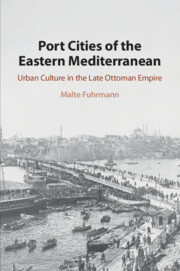Book contents
- Port Cities of the Eastern Mediterranean
- Port Cities of the Eastern Mediterranean
- Copyright page
- Contents
- Figures and Table
- Acknowledgments
- Part I Introduction
- Part II Constructing Europe
- Part III The City’s New Pleasures
- 8 Visiting, Strolling, Masquerading, Dancing
- 9 Staging Europeanness
- 10 Theater, the Civilizing Mission, and Global Entertainment
- 11 The One World of Workers of the Dramatic Arts
- 12 Beer Consumption and Production on Mediterranean Shores
- 13 Beer, the Drink of a Changing World
- Part IV Identities on the Mediterranean Shore
- Part V The End of the European Dream
- Part VI Europe and the Eastern Mediterranean Revisited
- Bibliography
- Index
10 - Theater, the Civilizing Mission, and Global Entertainment
from Part III - The City’s New Pleasures
Published online by Cambridge University Press: 09 October 2020
- Port Cities of the Eastern Mediterranean
- Port Cities of the Eastern Mediterranean
- Copyright page
- Contents
- Figures and Table
- Acknowledgments
- Part I Introduction
- Part II Constructing Europe
- Part III The City’s New Pleasures
- 8 Visiting, Strolling, Masquerading, Dancing
- 9 Staging Europeanness
- 10 Theater, the Civilizing Mission, and Global Entertainment
- 11 The One World of Workers of the Dramatic Arts
- 12 Beer Consumption and Production on Mediterranean Shores
- 13 Beer, the Drink of a Changing World
- Part IV Identities on the Mediterranean Shore
- Part V The End of the European Dream
- Part VI Europe and the Eastern Mediterranean Revisited
- Bibliography
- Index
Summary
The nineteenth century infatuation with opera by residents of Izmir, Istanbul, and Thessaloniki is grounded mainly in their attempt to take part in a global "civilizing mission." The middle classes and the administration intended but often failed to educate the lower classes to properly behavior during theater performances, refraining from smoking, eating, unpleasant bodily movements or ill-timed displays of veneration. Nonetheless, all these and also violence were not uncommon at the opera house. Moreover, opera aficionados wishes for a "one world" of global stage entertainment, for a cultural exchange with Western and Central Europe. Unfortunately, Western interest in Eastern music and narratives came to an end in the 1820s, whereas Eastern interest in Western performances gained momentum later.
- Type
- Chapter
- Information
- Port Cities of the Eastern MediterraneanUrban Culture in the Late Ottoman Empire, pp. 138 - 156Publisher: Cambridge University PressPrint publication year: 2020

